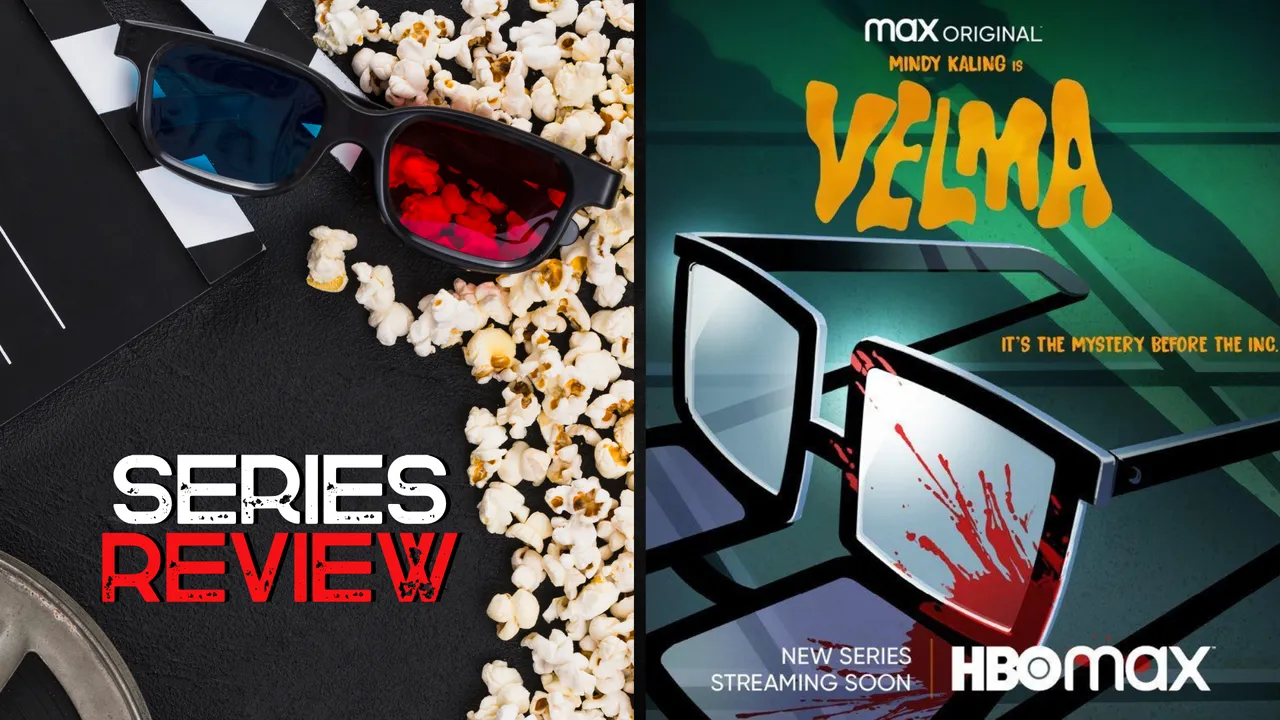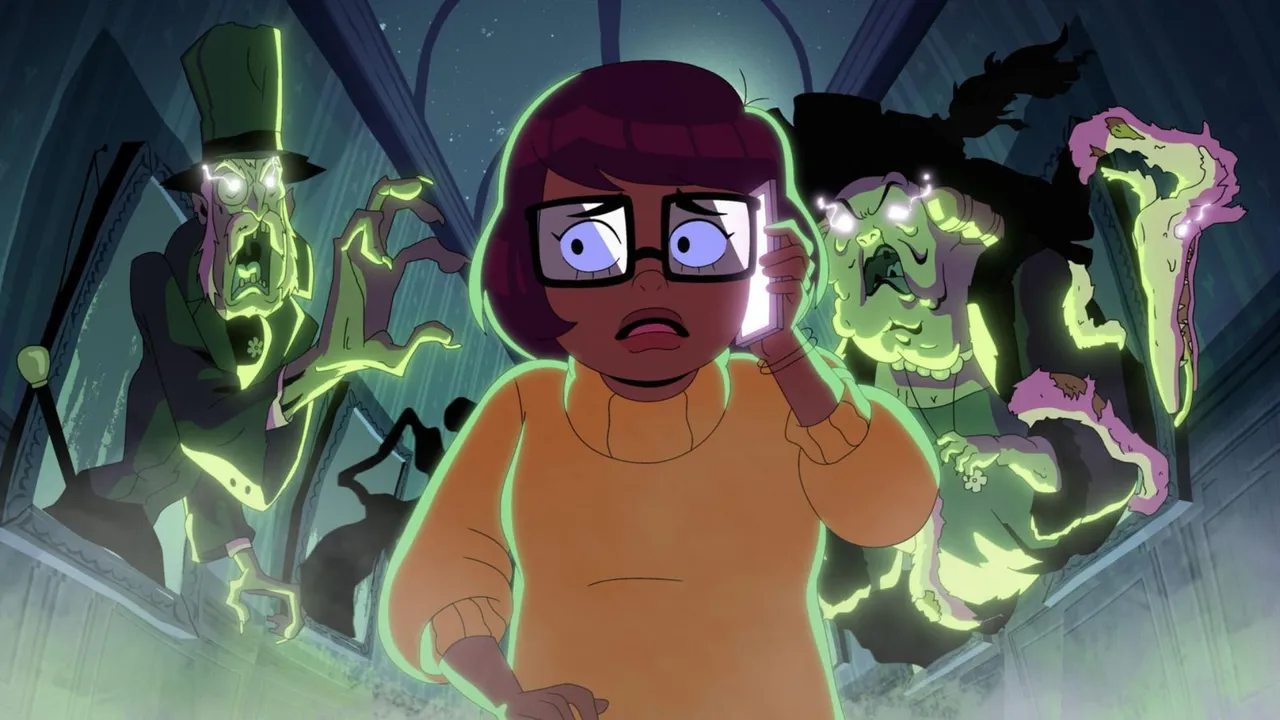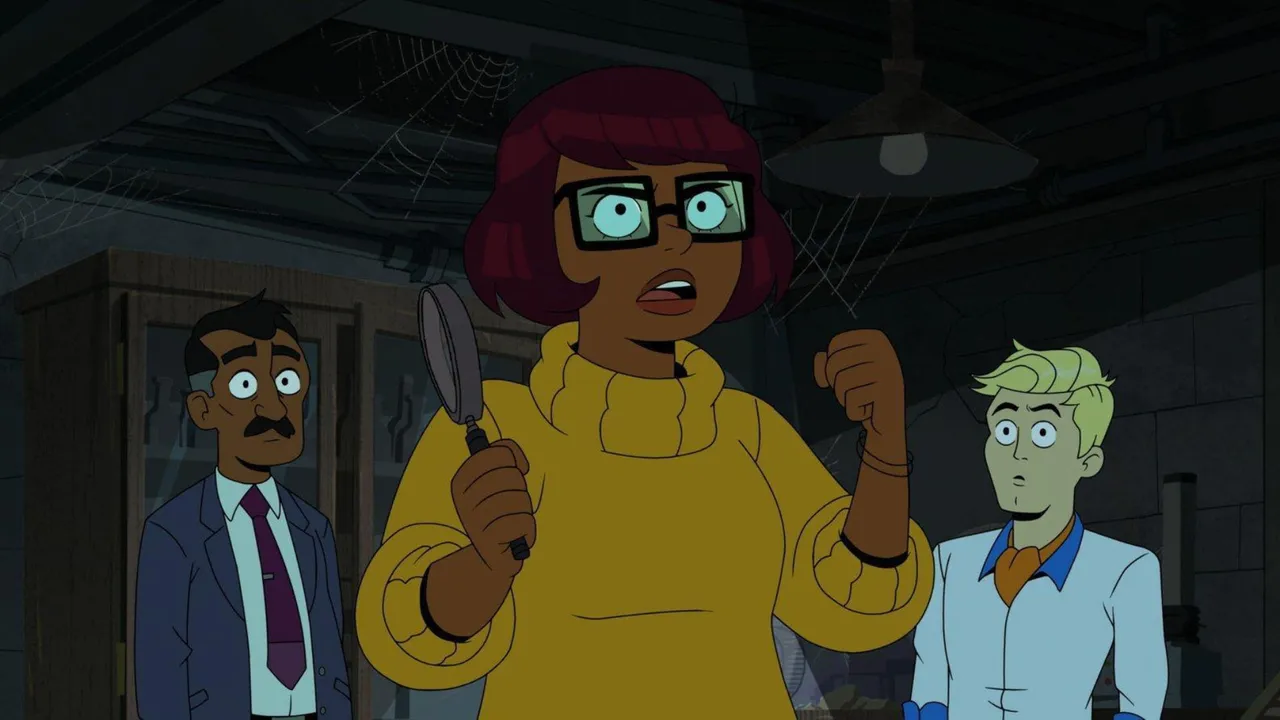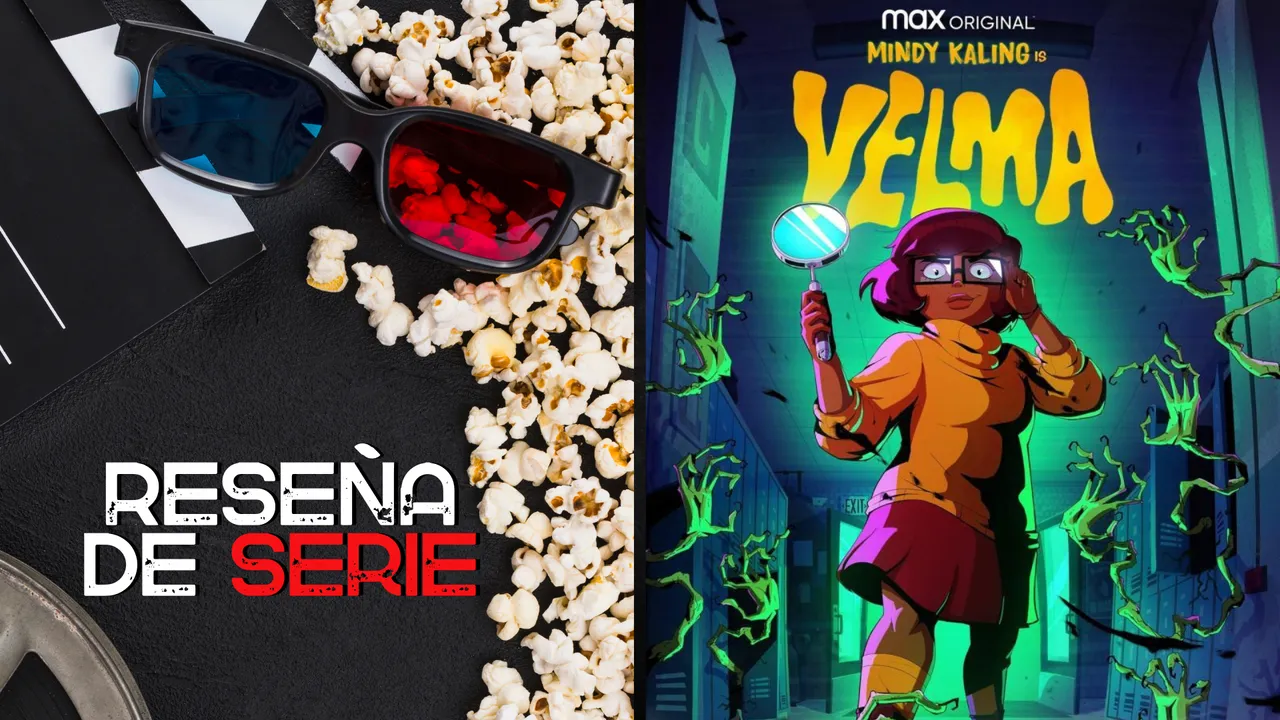

We are living in the age of inclusion, and it is an undeniable fact that it is here to stay, even if many dislikes it. Personally, I believe that inclusion does no harm to anyone, on the contrary, it gives visibility to groups that are often stereotyped or ignored. Why do I start with this? Because I have just seen a production that has been heavily criticised for alleged "forced inclusion", but no, I am not talking about The Little Mermaid.
Baje para ver la versión en español o haga clic - AQUÍ -
Today I want to talk about Velma, the Scooby-Doo spin-off series. I recently started watching it after a friend Hiver recommended it to me, and I must admit that I was pleasantly surprised. Although I had low expectations due to the bad reviews it received, during its 10 episodes it managed to entertain me enough to make me want to finish watching it.
The series begins by introducing Velma, a teenager as peculiar as can be, convinced that her mother did not abandon her and her father, she lives obsessed with discovering the supposed culprit of their disappearance, which causes her terrible hallucinations. However, her investigation is interrupted when several of her schoolmates are murdered, and she becomes the prime suspect. This forces her to search for the real culprit in order to prove her innocence.
As the investigation into the murders progresses, we learn the origins of each member of the S.A. Mysteries gang, as they all band together to do what they do best: unmask the culprits. The series delves deeper into the developing relationships between them - on the one hand, we have Norville trying to win Velma over (and then trying to get over her), while Velma and Daphne explore another facet of their friendship. As for Fred, well, let's just say he doesn't come off very well in this adaptation. Although he's Daphne's boyfriend at first, he ends up being a typical pretty boy, not very bright, not very nice.



The dynamic of the series is what you might expect from a Scooby-Doo spin-off. The characters follow clues that seemingly lead nowhere, until in the end, surprisingly, everything comes together, and they manage to discover the culprit, although not before mistakenly suspecting half the world. In short, and from my point of view, the season feels like a long episode of Scooby-Doo, what makes the difference is that it delves a little deeper into the characters and of course the good dose of black humour that the directors so aptly added.
Why did it receive such negative reviews? Mainly because Velma is a modern story, in keeping with its time, where Velma and Shaggy have a different ethnicity to the original, and where sexual orientations other than heterosexuality are presented. It also pokes fun at stereotypes that were supported by previous generations. I think this series was simply not fully understood. It does not pretend to be Scooby-Doo 2.0; the creators took the original idea and gave it a different approach, full of sarcasm, black humour and, above all, topicality. This last point is key to understanding Velma. If your minds are stuck on how things used to be done, you'll probably also give it a low rating on IMDB or Rotten Tomatoes.
The series pokes fun at the more illogical aspects of its predecessor, as well as making an amusing critique of current popular culture and our society. The mistake many people make is to expect everything to be the same as Scooby-Doo. This show was conceived for an adult audience, it is not a family cartoon, and it should be interpreted as such. I can't say it's the best animated series for adults, but it's not the terrible rubbish that many claims it to be.
The only thing I can fault the creators of Velma is that they deliberately sought to generate controversy. They knew the changes in ethnicity and sexuality would raise some eyebrows, but they didn't stop there; they also made it clear that this was their intention, poking fun at those who might be offended by the changes. It was a risky move that angered many, but I have to agree that I personally found it hilarious.



Unfortunately, Velma is a series that has been largely misunderstood, as it takes a completely different approach than expected. It is more of a parody than anything else. And although I enjoyed it quite a lot, I am aware that my sense of humour and tastes are peculiar, so I wouldn't dare recommend it to almost anyone except people with a fairly diverse sense of humour and a very open mind to inclusiveness and current issues.
What I liked the most
The irreverence with which certain themes were dealt with, such as the hypersexualisation of teenage girls, false female empowerment and the privilege of certain groups. I also really enjoyed the references to popular culture and the original series, and it was great to see the origin of the mystery machine.
What I liked least
The resolution of the mystery was too similar to what happens in Scooby-Doo. If they had already strayed so far from the original idea, it wouldn't have cost them anything to take a different approach to the investigation, so it wouldn't be so predictable.

El lado oscuro de Velma Dinkley



Estamos viviendo en la época de la inclusión, y es un hecho innegable que está aquí para quedarse, aunque a muchos les desagrade. Personalmente, considero que la inclusión no le hace daño a nadie, al contrario, da visibilidad a grupos que suelen ser estereotipados o ignorados. ¿Por qué inicio con esto? Porque acabo de ver una producción que ha sido duramente criticada por una supuesta "inclusión forzada", pero no, no estoy hablando de La Sirenita.
Hoy quiero hablarles de Velma, la serie spin-off de Scooby Doo. Recientemente, comencé a verla después de que un amigo Hiver me la recomendara, y debo admitir que me sorprendió gratamente. Aunque tenía pocas expectativas debido a las malas críticas que recibió, durante sus 10 episodios logró entretenerme lo suficiente como para que quisiera terminar de verla.
La serie comienza presentando a Velma, una adolescente tan peculiar como puede serlo, convencida de que su madre no los abandonó a ella y a su padre, vive obsesionada con descubrir al supuesto culpable de su desaparición, lo cual le ocasiona unas terribles alucinaciones. Sin embargo, su investigación se ve interrumpida cuando varias de sus compañeras de escuela son asesinadas, y ella se convierte en la principal sospechosa. Esto la obliga a buscar al verdadero culpable para demostrar su inocencia.
A medida que avanza la investigación de los asesinatos, vamos conociendo los orígenes de cada miembro de la pandilla de Misterios S.A., ya que todos se unen para hacer lo que mejor saben hacer: desenmascarar a los culpables. La serie profundiza en el desarrollo de las relaciones entre ellos, por un lado, tenemos Norville intentando conquistar a Velma (y luego tratando de superarla), mientras Velma y Daphne exploran otra faceta de su amistad. En cuanto a Fred, bueno, digamos que no sale muy bien parado en esta adaptación. Aunque al principio es el novio de Daphne, termina siendo el típico chico bonito, no muy brillante, ni muy simpático.



La dinámica de la serie es la que podríamos esperar de un spin-off de Scooby Doo. Los personajes siguen pistas que aparentemente no los llevan a ningún lado, hasta que al final, sorpresivamente, todo encaja y logran descubrir al culpable, aunque no sin antes sospechar erróneamente de medio mundo. En pocas palabras, y desde mi punto de vista, la temporada se siente como un episodio largo de Scooby Doo, lo que hace la diferencia es que profundiza un poco más en los personajes y por supuesto la buena dosis de humor negro que los directores tan acertadamente le agregaron.
¿Por qué recibió críticas tan negativas? Principalmente, porque Velma es una historia actual, acorde a su tiempo, donde Velma y Shaggy tienen una etnia distinta a la original, y donde se presentan orientaciones sexuales diferentes a la heterosexualidad. Además, se burla de los estereotipos que eran apoyados por generaciones anteriores. Creo que esta serie simplemente no fue comprendida en su totalidad. No pretende ser Scooby-Doo 2.0; los creadores tomaron la idea original y le dieron un enfoque diferente, lleno de sarcasmo, humor negro y, sobre todo, actualidad. Este último punto es clave para entender Velma. Si sus mentes están atrapadas en cómo se hacían las cosas antes, seguramente también le darán una calificación baja en IMDB o Rotten Tomatoes.
La serie se burla de los aspectos más ilógicos de su predecesora, además de hacer una divertida crítica a la cultura popular actual y a nuestra sociedad. El error de muchos es esperar que todo sea igual que en Scooby Doo. Este programa fue concebido para una audiencia adulta, no es una caricatura familiar, y así debe ser interpretado. No puedo decir que sea la mejor serie animada para adultos, pero tampoco es la terrible basura que muchos afirman que es.
Lo único que puedo reprocharle a los creadores de Velma es que buscaron deliberadamente generar polémica. Sabían que los cambios étnicos y de sexualidad levantarían algunas cejas, pero no se conformaron solo con eso; además, dejaron en claro que esa era su intención, burlándose de aquellos que podrían sentirse ofendidos por dichos cambios. Fue un movimiento arriesgado que enojó a muchos, pero debo aceptar qye a mí personalmente me pareció realmente divertido.



Lamentablemente, Velma es una serie que ha sido malinterpretada en gran medida, ya que tiene un enfoque completamente diferente al que se esperaba. Se trata más de una parodia que de otra cosa. Y a pesar de que yo la disfruté bastante, soy consciente de que mi sentido del humor y mis gustos son peculiares, por lo que no me atrevería a recomendarla a casi nadie, excepto a personas con un humor bastante diverso y con una mentalidad muy abierta a la inclusión y a temas actuales.
Lo que más me gustó
La irreverencia con la que se trataron ciertos temas, como la hipersexualización de las adolescentes, el falso empoderamiento femenino y los privilegios de ciertos grupos. También disfruté mucho de las referencias a la cultura popular y a la serie original, y fue genial ver el origen de la máquina del misterio.
Lo que menos me gustó
La resolución del misterio se asemejaba demasiado a lo que ocurre en Scooby Doo. Si ya se habían alejado tanto de la idea original, no les hubiera costado nada darle un enfoque diferente a la investigación para que no resultara tan predecible.

Thank you very much for reading me, see you in comments
Muchas gracias por leerme, nos vemos en comentarios



Banner edited by me in Canva. - Cartoons made on Bitmoji.
Translated with the help of DeepL.
Banner editado por mí en Canva. - Caricaturas hechas en Bitmoji.
Traducido con la ayuda de DeepL.
